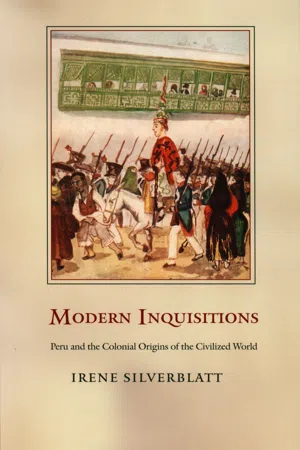
Modern Inquisitions
Peru and the Colonial Origins of the Civilized World
- English
- PDF
- Available on iOS & Android
Modern Inquisitions
Peru and the Colonial Origins of the Civilized World
About This Book
Trying to understand how "civilized" people could embrace fascism, Hannah Arendt searched for a precedent in modern Western history. She found it in nineteenth-century colonialism, with its mix of bureaucratic rule, racial superiority, and appeals to rationality. Modern Inquisitions takes Arendt's insights into the barbaric underside of Western civilization and moves them back to the sixteenth century and seventeenth, when Spanish colonialism dominated the globe. Irene Silverblatt describes how the modern world developed in tandem with Spanish imperialism and argues that key characteristics of the modern state are evident in the workings of the Inquisition. Her analysis of the tribunal's persecution of women and men in colonial Peru illuminates modernity's intricate "dance of bureaucracy and race."
Drawing on extensive research in Peruvian and Spanish archives, Silverblatt uses church records, evangelizing sermons, and missionary guides to explore how the emerging modern world was built, experienced, and understood by colonists, native peoples, and Inquisition officials: Early missionaries preached about world history and about the races and nations that inhabited the globe; Inquisitors, able bureaucrats, defined who was a legitimate Spaniard as they executed heretics for "reasons of state"; the "stained blood" of Indians, blacks, and descendants of Jews and Moors was said to cause their deficient character; and native Peruvians began to call themselves Indian.
In dialogue with Arendt and other theorists of modernity, Silverblatt shows that the modern world's underside is tied to its origins in colonialism and to its capacity to rationalize violence. Modern Inquisitions forces the reader to confront the idea that the Inquisition was not only a product of the modern world of the sixteenth and seventeenth centuries, but party to the creation of the civilized world we know today.
Frequently asked questions
Information
Table of contents
- Contents
- About the Series
- Acknowledgments
- Prologue
- Three Accused Heretics
- Inquisition as Bureaucracy
- Mysteries of State
- Globalization and Guinea Pigs
- States and Stains
- New Christians and New World Fears
- The Inca’s Witches
- Becoming Indian
- Afterword
- Appendix: Notes on Bias and Sources
- Notes
- Bibliography
- Index